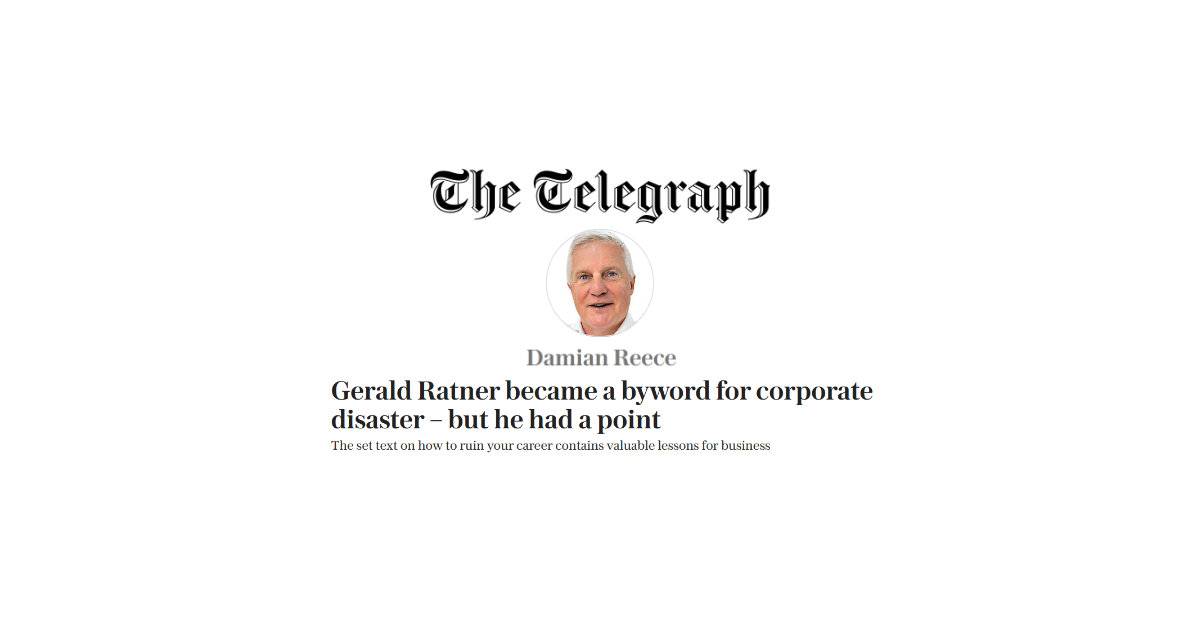The following article by Vigo’s Senior Counsel Damian Reece appeared in The Telegraph on Friday, 25 April.
It was this week in 1991 that Gerald Ratner woke up a genius and went to bed a clown, his high-flying career and eponymous international jewellery empire in ruins thanks to one disastrous speech.
His address to the Institute of Directors’ annual conference remains the set text in the study of how to ruin your career through catastrophic communications.
Business leaders still curse themselves by “doing a Ratner”.
Mike Coupe was the chief executive of Sainsbury’s caught on camera in 2018 singing “We’re in the money” as he awaited an ITV interview about his company’s putative £13bn merger with Asda – and a widely expected rise in his own personal wealth.
Sometimes words come back to haunt you. Mike Jeffries, the chief executive of US fashion chain Abercrombie & Fitch gave an interview in 2006 saying: “A lot of people don’t belong [in our clothes], and they can’t belong. Are we exclusionary? Absolutely.”
His obnoxious words sank without trace until they resurfaced in 2013, when attitudes had changed, and social media lit up with a boycott campaign. The blogosphere went berserk. A year later, he retired.
In 2001 David Shepherd, the brand director of Topman, likened his male customers to “football hooligans”, saying they mainly wore suits for court appearances.
However, Ratner remains the sine qua non for career-defining, if not always career-ending, chief executive gaffes.
The key lessons from his 25 minutes of madness are not the obvious ones about media training and staying “on message”. Much of his speech was spot on and resonates today, while the most important lesson has been overlooked by history.
For the uninitiated, Ratner stood up in front of a packed Royal Albert Hall and bragged about his brilliance at the expense of his customers.
“We do cut-glass sherry decanters complete with six glasses on a silver-plated tray that your butler can serve you drinks on, all for £4.95. People say to me, ‘How can you sell this for such a low price?’ I say, ‘Because it’s total crap.’”
He was just warming up.
“We even sell a pair of gold earrings for less than £1. People say that’s less than a prawn sandwich from Marks & Spencer. I have to say, the sandwich will probably last longer than the earrings.”
Cue laughter, led by minor Royals chortling in the front row. Ratner brought the house down, but the roof fell in on himself, his business and his shareholders.
The media frenzy that followed was a pile-on impressive even by today’s standards. The tabloids especially loved it because their readers were Ratner’s customers. It was that rare thing, a vividly colourful business story amid a grey and depressing recession.
The Ratners share price cratered, wiping out £500m of shareholder value. Eighteen months and one financial restructuring later, and Ratner was out of a job, leaving the phrase “doing a Ratner” as his legacy, shorthand for any CEO-sized PR gaffe.
But watch the full speech again on YouTube and his real message rings true even now: that in times of economic challenge, a focus on the customer and giving them what they want is paramount. This might sound trite, but is much easier said than done.
Remember, in April 1991 we were in the grip of a brutal recession characterised by the negative equity crisis, when millions of homeowners had mortgages worth more than their property and repossessions were soaring.
Interest rates were high – in part to ensure the pound’s membership of the European Exchange Rate Mechanism – and the result was a recession led by declining consumer spending rather than a manufacturing-led recession which had been the norm previously.
Despite this high street slump, Ratners was a jewellery and gifts chain which, the day before Ratner’s speech, had posted annual profits of £120m with a 34pc market share. He must have been doing something right.
The Ratners group had fascias for distinct consumer propositions at different price points. From Ratners at the bottom end, through H Samuel in the middle to Watches of Switzerland retailing pieces for £250,000 (£680,000 at today’s inflation-adjusted money) this range helped him dodge the downturn.
To beat the recession, Ratner urged his rapt audience, you need to innovate, throw out the old rules, give consumers what they want.
Manage margins yes, but offer new products, new ideas, new promotions. Train your staff, communicate with them and incentivise them. Collaborate with the supply chain to innovate. When there’s a cost of living crisis, make life more affordable for people.
His message was that no business can ever know everything about its market, but the winners will know more than their competitors. That’s the only basis for success.
All of which made Ratner right. Yet, while his speech contained all the right messages, it was delivered using all the wrong language.
It’s not Ratner’s jokes at the expense of his customers that reveal the most important lesson from his speech. Tucked away towards the end is a passage about Ratners’ US expansion, first acquiring Sterling Jewelers in 1990 then Kay Jewelers shortly after. The latter deal went down extremely badly with the stock market.
Ratner’s disgust with the negative reaction from City analysts and the media is obvious.
“There were even calls from institutions for us to appoint non-executive directors to the board,” an incredulous Ratner decries to the Royal Albert Hall.
Here lies the key lesson.
Back in 1991, non-executives were a much rarer beast. Boards did not entertain a culture of challenge as a rule. Ratner, the genius, was too clever to hire capable professionals to provide independent counsel, be they non-executives or external advisers free of conflict.
This lack of challenge still persists in British business. It was a major contributor to why banks failed in 2008 and the collapse of large public companies such as Carillion, which failed in 2018.
The fact is, Ratner didn’t walk into the Royal Albert Hall and make some disastrous jokes by accident. He walked into the situation because there was no effective challenge around him – not as a high street trader, but as a business leader and communicator.
In subsequent interviews about that day, Ratner has revealed he did show the speech to one of his fellow Ratner directors before delivering it.
The director read it and told his boss he thought it was boring. The director’s advice? “It needs a joke.”





















